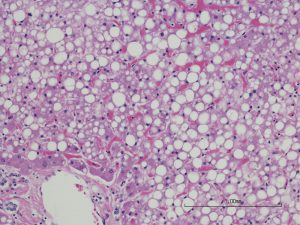From Bench to Clinic and Back Again: Duke's NAFLD Research Program

Nonalcoholic fatty liver disease (NAFLD) affects up to one-third of the US population. Yet, there are no therapies approved by the US Food and Drug Administration for NAFLD, and, beyond modifications to diet and exercise, very little can be done to prevent the symptoms of NAFLD from worsening.
The Duke Nonalcoholic Fatty Liver Clinical Research Program seeks to develop new treatment options by studying disease mechanisms and conducting clinical trials to treat the full spectrum of NAFLD.
Gastroenterologist Manal Abdelmalek, MD, who, together with Anna Mae Diehl, MD, directs the program, says their research has lent insight into the pathogenesis of the disease, which, in turn, has led to the development of new and novel therapies.
Current standard of care for NAFLD includes helping patients improve their diet and exercise habits, as well as adjusting their risk factors associated with fatty liver disease, such as diabetes and hypertension. These interventions can dramatically help control blood glucose and normalize liver enzymes in patients in the early stages of the disease, thus helping to stave off cirrhosis. However, for patients with advanced liver fibrosis and cirrhosis, in particular, additional treatment options are needed to prevent the complications of the disease.
When patients arrive at the liver clinic at Duke, Abdelmalek explains that they are presented with all aspects of standard clinical care and provided the opportunity to discuss treatments that may be available to them through a clinical trial. These can range from repurposed drugs to newly developed therapies.
“While therapy is currently limited,” she says, “there are several emerging therapies on the horizon that may alter the treatment landscape in the near future.”
At present, the program is involved in 20 ongoing clinical trials, all of which target different aspects of fatty liver disease. Some are testing anti-inflammatory drugs designed to treat steatohepatitis, while others involve antifibrotic therapies aimed at reversing cirrhosis.
Abdelmalek credits the program’s success to its integration of basic science research and the clinic. “There’s no other program in the country that bridges the bench to the clinic and the clinic to the bench and provides this depth and breadth of care to patients with NAFLD.”